What The Coronavirus (COVID-19) Means For Marketers

By now you have heard about the Coronavirus.
The sad reality is that it is spreading quickly and will continue to spread for a while.
Did you know that we are getting roughly 15,000 new cases a day and it’s growing fast?
No one really knows how many people will be infected (or will pass away sadly), but it has caused the global stock markets to crash, which means as a business (or even a marketer), you will be affected.
And because my ad agency works with hundreds of companies in all the major sectors and we have 7 offices around the world, we are already starting to see how it is impacting marketing (I’ll share the data below).
So what does this mean for you?
Well, before I go into that, let me be clear on what marketers should NOT do.
Don’t exploit the situation
The first thing we are seeing is people trying to exploit fear.
What I mean by this is supplies are running low around the world. From masks and toilet paper to hand sanitizer and other basic necessities… I am seeing marketers buying them and then reselling them on eBay or running ads and selling them for 10-50x the price.
This isn’t entrepreneurship and this isn’t marketing. I highly recommend that you avoid exploiting the Coronavirus situation to make a quick buck.
Not only is it wrong but it is also very short-sighted. Sure you may be able to make a quick buck, but it won’t last… you are better off spending your time on anything that is long term.
So now that we got that out of the way, what does the Coronavirus mean for marketers?
Businesses are going to struggle for a while
Even if the virus slows down fast as the numbers have dropped in China, businesses are going to struggle for well over a year because they will have to make up for their losses.
For example, in China the virus caused retail sales to drop by 20.5% and the unemployment rate jumped to 6.2 in February.
When companies like Apple shut down their stores to help reduce the spread, it means less income and less profit. Sure they are able to pay their employees during their temporary shutdown, but not all companies have their bank balance and most won’t be able to do the same.
Just look at the travel industry. The virus is expected to lose them 820 billion dollars. Virgin Atlantic just asked their staff to take an 8-week unpaid leave.
The ports are also empty and the first rounds of layoffs have already started.
It’s estimated that in total COVID-19 will cost the global economy $2.7 trillion.
And not only are people losing money but they are losing traffic and conversions.
Organic traffic is down in most industries
As I mentioned above, we work with hundreds of clients in different industries through my agency. On top of that, we also have tons of data because of Ubersuggest.
Before I dive into the data, note that we didn’t focus on any one single country, we decide to look at the traffic stats from a global perspective. We also didn’t include data from sites with less than 5000 visitors a month as they tend to have drastic swings from a percentage perspective even when there are no global issues or algorithm updates.
We also don’t have data on every single industry, for example, we don’t really work with many restaurants nor do we purchase data for that category as local restaurants usually don’t have the biggest marketing budgets. We have data on most of the major ones, but again not all.
Now, from an SEO standpoint, last week we saw huge drops in organic traffic for most industries we are tracking. Just look at the chart below (compares last week to the previous week).
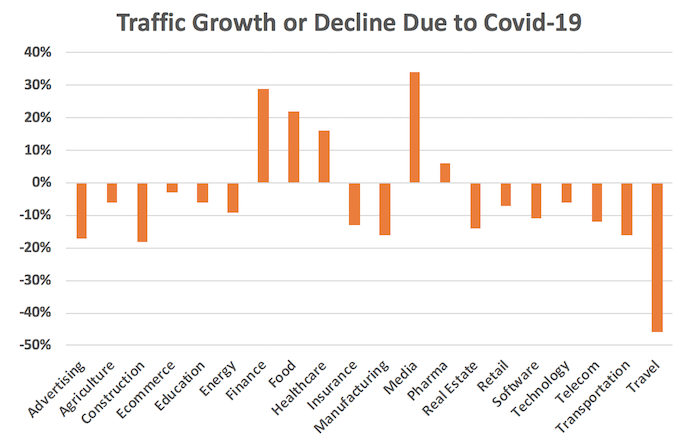
If you are in the news industry or financial space, your traffic skyrocketed.
And if you are in the travel industry, you saw massive drops in traffic.
You can’t tell by the chart, but e-commerce was a mixed bag, depending on what sites sold, traffic was either up or down. For example, if you were selling baby products like diapers or wipes then you saw a nice bump in traffic.
But if you were selling luxury goods like big-screen televisions you saw a drop in traffic.
Conversions were also down for most industries
From a conversion rate standpoint, we saw drops in most industries as well. Even the financial sector, which had big traffic booms in traffic, dropped in conversions.
Just look at the chart below (comparing last week to the previous week):
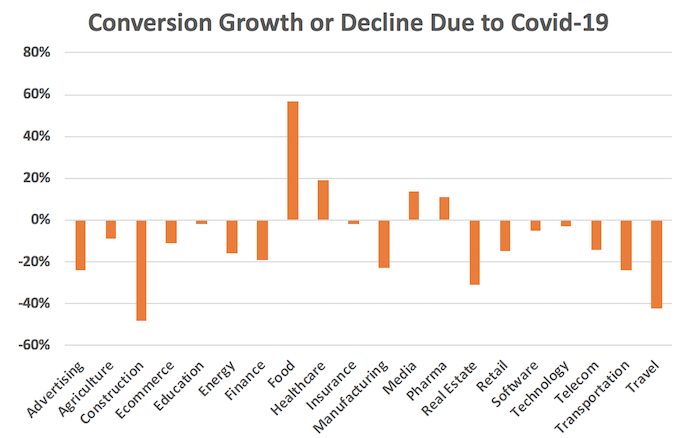
As for news (media) sites, they had a big conversion lift as many of them charge for people to read their updated information.
For example, you can only read a certain amount of content from the Washington Post for free until you see a message that looks like this:
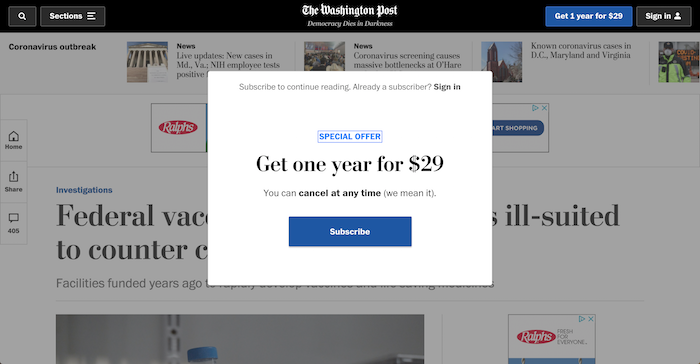
People didn’t want to miss out on Coronavirus, political and financial information with the turmoil, hence news sites saw a nice lift.
And with some sectors like travel, they are currently offering massive discounts, which is helping counteract some of their traffic declines. Overall, they are still seeing a massive revenue hit.
Pay-per-click data
We don’t have as much pay-per-click data as we do for SEO as Ubersuggest is mainly used for SEO purposes, but we haven’t seen big shifts in cost per click… even for things like the travel industry.
We don’t have a big enough sample size, but as I mentioned, costs haven’t come down much.
For example, even though we saw big dips in the number of people searching for things like flights or hotels, we didn’t see a drastic drop in CPC but we did see a big increase in cost per acquisition.
In other words, you can still roughly pay the same amount per click, but the cost per conversion has been going up for most industries… unless you are selling necessities like toilet paper.
So what does this mean for marketers?
Be fearful when others are greedy, and greedy when others are fearful
I didn’t come up with that saying, it’s actually a line from Warren Buffett.
You will see people cutting back because the economy is predicted to get hit by 2.7 trillion dollars and experts are saying that we are going to go into a recession.
You even have billionaire investors like Carl Ichan saying that the market has more room to go down and we should expect the sell-off has longer to go.
But what I’ve learned from going through two crashes (the dotcom crash in 2000 and the real estate crash in 2008) is that the best time to double down is when others are not.
During an economic downturn, you’ll find that you will have less competition, which means it is easier and faster to get results, and in some cases, you’ll be able to get deals, such as a potential reduction in pay-per-click advertising.
Just think of it this way: out of all the publicly traded companies in the United States, if the market keeps going down, many of them will struggle to pay off their debt, which has exploded to $75 trillion.
This means some companies will either go bankrupt, get bought out, or get bailed out by the government. Some may be able to cut costs enough to pay their bills, but for most, it will be too late.
Again, this just means less competition for you.
If you are lucky enough to be sitting on some cash during the recession this is the best time to buy out other companies. The ideal ones to buy are media companies.
The more eyeballs you control, the more power you will hold in the future. Plus, by controlling eyeballs, it gives you the ability to sell anything you want in the future.
It’s the reason I bought the KISSmetrics website for $500,000 a couple years ago. During their peak, they had 1,260,681 million unique visitors a month.
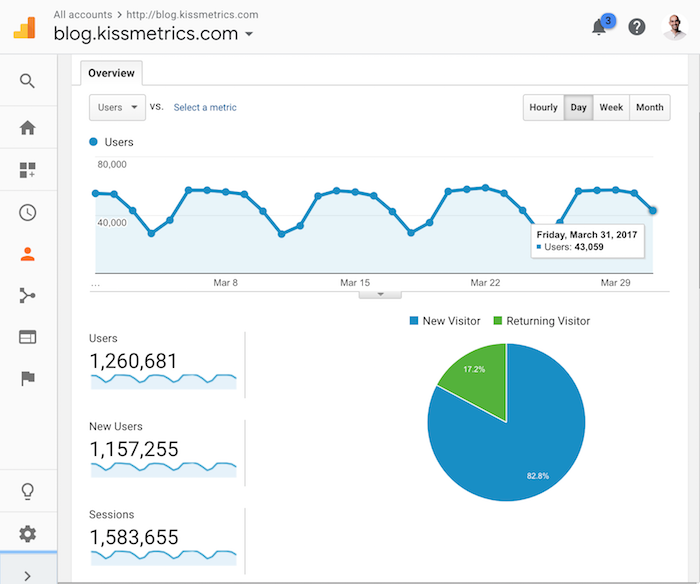
That’s a lot of traffic.
When I bought the site out, I was out a good amount of money for me, but the moment I merged it into the NeilPatel.com site, I increased my lead count by 19% and recuperated my investment in less than a year.
In other words, this is your opportunity to strike and gain market share.
So when you see your competitors closing down or slowing down on their marketing, the goal is to double down. You may not see the biggest return right away, but in the long term, you will.
Every time the market goes down by 20% or more it roughly takes 536 days to recover.
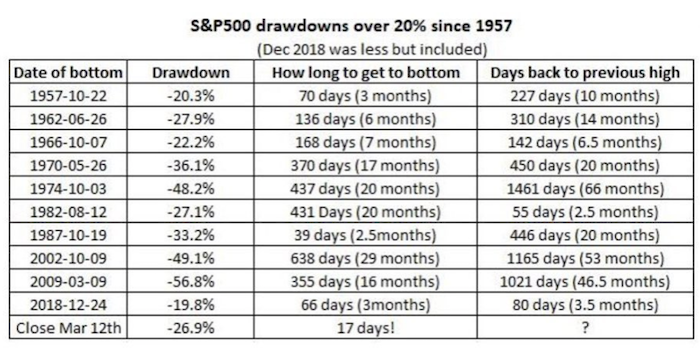
As we recover, you’ll see your revenue climb and the ROI from your marketing spend go through the roof.
Conclusion
Hopefully, the Coronavirus passes soon and it has minimal impact on lives. For the time being, try not to socialize with others too much or go into crowded places.
You should read this article by the Washington Post as it breaks down great simulations of how the Coronavirus will spread and what we can do to reduce the impact on the world.
And as for your marketing, this is the time for you to double down. Don’t be fearful when others are also afraid. Do what Warren Buffett does… be greedy when other people are fearful.
In other words, double down.
How have you seen the Coronavirus affect your traffic?
PS: Please be safe and, if possible, stay indoors.
PPS: To help out a bit, I’ve opened up the keyword ideas report on Ubersuggest as well as historical keyword data. I know many of you may be facing financial difficulty, so hopefully having the data helps you save a bit of money on marketing.
The post What The Coronavirus (COVID-19) Means For Marketers appeared first on Neil Patel.
from Tumblr https://ift.tt/3b1d7d3
Comments
Post a Comment